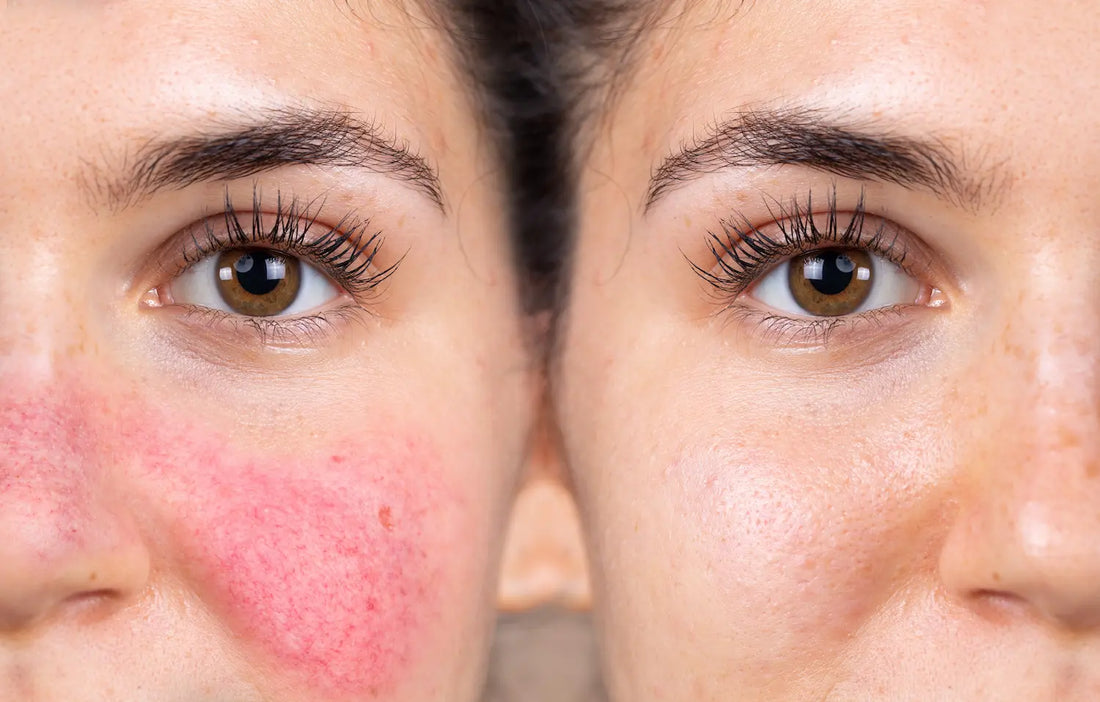
Three Steps to Radical Simplicity for Sensitive Skin
Part I: The Over Complication Epidemic
We’ve been taught to fix our skin by piling on more.
More serums.
More steps.
More “solutions.”
But sensitive skin often gets worse the more you try to fix it.
At TSORI, we believe radical simplicity isn’t a trend—it’s a return. A restoration of what was always enough.
This is a guide for the skin that stings, flushes, or flares under the weight of modern skin care. If you’ve been told your skin is “difficult,” this is for you.
What Happens When You Use Too Much?
Modern skin care culture encourages a 10-step routine. But for sensitive skin, that often looks like:
- Redness
- Ingredient fatigue
- Dehydration masked as “moisturization”
- Damaged lipid barrier
The Skincare Overload Feedback Loop

Part II: Why Sensitive Skin Craves Simplicity
Your skin isn’t fragile.
It’s perceptive.
Sensitive skin isn’t weak—it’s wise. It reacts to what most skin types quietly endure. And when it’s overwhelmed by unnecessary ingredients, confusing formulations, or constant stimulation, it doesn’t whisper. It shouts.
Redness. Burning. Flaking. Breakouts.
Not because your skin is broken—
But because it’s trying to protect you.
The Myth of More
Modern skincare culture thrives on the idea that more = better. More steps. More actives. More acids. More targeted solutions for problems you didn’t know you had.
But sensitive skin doesn’t need more. It needs clarity. It needs space. It needs relief.
Every additional product in your routine increases the risk of:
- Barrier disruption
- Cumulative ingredient irritation
- Over-exfoliation and inflammation
- Long-term sensitization
This is especially true in formulas labeled as clean skin care products, which often still rely on synthetic emulsifiers, esters, and “natural” fragrances that confuse and fatigue sensitive skin.
Why Minimalist Skin Care Works (Especially for Reactive Skin)
1. Fewer Ingredients = Fewer Triggers
Most irritation doesn’t come from dryness. It comes from exposure. Every surfactant, preservative, and synthetic compound—no matter how “gentle”—is another invitation for reactivity.
Minimalist skin care eliminates unnecessary complexity. By removing what doesn’t belong, you give your skin a chance to restore what always did: balance.
TSORI’s principle: Whole plants over lab mimicry.
Always.
We believe natural beauty products should be radically pure, not chemically altered to behave like the real thing. Our commitment to natural personal care products means no isolates, no fragrances, and no confusion for your skin.
2. Less Processing = More Healing
When botanicals are left whole—cold-pressed, infused, and unrefined—they offer a kind of synergy that lab-made extracts can’t replicate.
Compare:
- Lab-isolated compounds = 1 or 2 known actives
- Whole-plant extracts = 200+ phytonutrients working in harmony
Your skin is alive. It recognizes the intelligence in unprocessed botanicals. That’s why natural skin care remedies—the real kind, not the watered-down kind—calm what synthetic ingredients inflame.
“I spent years trying product after product. When I stripped my routine down to three whole-plant formulas, my skin finally stopped reacting. It didn’t need more. It needed less.” — Nicole, TSORI Founder
3. Simpler Routines Strengthen the Skin’s Ecosystem
The skin isn’t just a surface. It’s an ecosystem. Overuse of even the most “luxurious” products can disrupt its microbiome and natural lipid production.
A simple skin care routine doesn’t mean compromise. It means support. It means working with the skin instead of constantly interrupting its natural intelligence.
At TSORI, we recommend just three steps—cleanse, nourish, and seal—with products that double and triple-task through multifunctional botanicals.
This isn’t just natural moisturizer for dry skin. It’s functional plant medicine. Sacred simplicity for skin that’s tired of being overstimulated.
What You Remove Is Just as Important as What You Apply
Minimalism isn’t a marketing trend. It’s a healing method.
By removing water (and with it, the need for preservatives), removing synthetics (no PEGs, no esters, no lab tricks), and removing over-complication, you create space for the skin to remember how to function on its own.
Sensitive skin craves this return to simplicity.
Not out of fragility, but because it has no tolerance for compromise.
Top 5 Ingredients to Avoid for Reactive Skin
Even in “Clean Beauty” Products
|
Ingredient |
Why It Irritates |
Commonly Found In |
TSORI Stance |
|
Phenoxyethanol |
Preservative linked to irritation, especially around eyes and lips |
"Fragrance-free" moisturizers, serums, micellar waters |
Never used. |
|
Synthetic Esters |
Mimic oils but can clog pores, disrupt lipid balance, and offer no whole-plant value |
Lightweight “natural” creams, “dry oils” |
Never used. We use real oils. |
|
“Fragrance” / “Parfum” |
Can contain hundreds of undisclosed ingredients that trigger inflammation |
Most conventional and clean-labeled products |
Always transparent. Always whole-plant. |
|
Cocamidopropyl Betaine |
Common surfactant shown to aggravate eczema and rosacea |
Foaming cleansers, shampoos, baby washes |
Not in any TSORI cleanser. |
|
Emulsifying Waxes (e.g., Cetearyl Alcohol + Polysorbates) |
Emulsifiers can strip the barrier and accumulate over time |
Lotions, creams, emulsified oil cleansers |
We are 100% emulsifier-free. |
The above table lists the top 5 ingredients to avoid for sensitive or reactive skin, including phenoxyethanol, synthetic esters, and fragrance. TSORI products use none of these.
Part III: Three Steps to Radical Simplicity for Sensitive Skin
Let’s get practical.
Here is a complete minimalist skin care routine using only whole-plant, professional organic skincare—designed to calm, repair, and rebalance sensitive skin.
STEP 1: Cleanse Gently with Whole-Oil Cleansing
Most “clean” cleansers still contain:
- Emulsifiers
- Surfactants
- Stripping alcohols
Which can lead to what we call invisible barrier erosion.
Common Cleanser Ingredients That Irritate Sensitive Skin

The above bar graph compares ingredient categories like emulsifiers, alcohols, synthetic esters, showing their frequency in conventional products.
Instead, we use oil cleansing—not with synthetic esters—but with cold-pressed botanical oils rich in essential fatty acids and antioxidants.
TSORI Tip:
Use Trinity Lumière, our 3-in-1 elixir, to gently dissolve impurities while feeding your skin’s microbiome. No water. No foam. Just nourishment.
"Once I removed all surfactants from my skincare routine, my cheeks stopped breaking out. No tightness, no dry patches. Just comfort." — Nicole, TSORI Founder
STEP 2: Replenish with a Natural Moisturizer for Dry Skin
Most moisturizers marketed for sensitive skin are actually full of:
- Water (listed first)
- Petroleum-derived occlusives
- Emulsifiers that disturb the skin’s microbiome
But water ≠ hydration.
Hydration is cellular function. And that comes from lipids, phytosterols, and whole-plant antioxidants—not synthetics.
Best Ingredients for Sensitive Skin Moisturizers:
|
Ingredient |
Benefit |
Why It’s in TSORI |
|
Balm of Gilead |
Soothing, anti-inflammatory resin |
Hero extract |
|
Meadowfoam Seed Oil |
Balances sebum, locks in moisture |
Core oil |
|
Camellia & Jojoba Oils |
Mimic skin’s sebum, ultra-gentle |
Skin-identical |
|
Sea Buckthorn CO2 |
Repairs and brightens without irritation |
Targeted renewal |
|
Blue Tansy |
Calms inflammation |
Sensitive skin savior |
The above table compares five whole-plant ingredients and their specific benefits for dehydrated, sensitive skin.
Natural skin moisturizer for dry skin shouldn’t sting. It should feel like relief.
STEP 3: Protect and Seal Without Blockage
You don’t need to suffocate your skin to protect it.
Many “moisturizers for dehydrated skin” rely on synthetic occlusives that trap sweat and bacteria—leading to congestion.
We believe in breathable protection.
TSORI’s final layer:
- Lune Noire Body Oil or Noira Lumière Balm
- No waxes that clog
- No synthetic barrier agents
- Just whole botanicals that work with your skin’s needs
"With just three steps, I finally stopped reacting to everything I touched. It wasn’t my skin—it was the system that was broken."
Part IV: Beyond the Routine—Rethinking Clean Beauty
The clean beauty movement began with promise: a shift away from the harsh synthetics and hormone-disrupting ingredients of conventional skincare. But somewhere along the way, the mission got diluted.
Today, “clean beauty” is more of a marketing angle than a true commitment. Labels flaunt buzzwords—natural, green, non-toxic—while the formulas beneath them tell a different story.
Let’s pull back the curtain.
The Hidden Compromises in Most “Clean” Skincare
Most “clean” products still rely on:
- Synthetic esters (lab-created compounds that mimic natural oils but offer none of their complexity or synergy)
- Microplastics and PEGs (used as emulsifiers and texture enhancers)
- Preservatives like phenoxyethanol (linked to irritation, yet labeled “safe” under certain thresholds)
- Fragrance blends hidden under “aroma,” “parfum,” or even “essential oil blends” that aren’t fully disclosed
- Water as the first ingredient—diluting potency and requiring additional preservatives to keep the formula shelf-stable
And for sensitive skin, each of these is a potential trigger. A so-called natural skin care remedy becomes the very thing disrupting your skin barrier.
Greenwashing by Design
It’s legal in most countries to call a product natural or clean without meeting any official standard. That means a brand can include one plant extract and still claim “natural” on the front—while hiding petroleum derivatives, silicones, and synthetics in the back.
TSORI’s Uncompromising Standard
We didn’t create TSORI to blend into this system. We created it to rebuild a new one.
Where organic professional skin care means more than a certificate—it means whole-plant extractions. Real oils. Resins. Waxes. Not chemically altered derivatives of them.
We go beyond "clean":
- No water
- No synthetics
- No esters, isolates, or shortcuts
- Every formula is made from unrefined, cold-pressed, and infused botanicals—never lab-assembled
This is not just natural skincare for sensitive skin. It’s a quiet rebellion against a beauty system built on manipulation, dilution, and overwhelm.
Why Sensitive Skin Deserves Better
Sensitive skin isn’t a flaw—it’s feedback. And what it’s telling you is that your skin doesn’t need more products with better branding. It needs fewer, better formulas rooted in nature’s unedited intelligence.
You won’t find “dewy” esters or long-winded chemical names in TSORI. Only what your skin recognizes. What it trusts. What it already knows how to use.
Because healing shouldn’t require compromise.
Part V: Ritual as Rebellion
In a world that tells us we must do more to be beautiful, doing less becomes a kind of rebellion.
Your easy skin care routine is not laziness. It’s intelligence. It’s alignment with what your skin actually wants:
- Fewer ingredients
- Better integrity
- Slower beauty
Natural skin care remedies aren’t shortcuts. They’re time-honored methods grounded in wisdom.
And they work.
Final Words: Radical Simplicity Isn’t Just a Skincare Choice—It’s a Lifestyle
Sensitive skin isn’t wrong. It’s right.
It’s responding to a world of overstimulation with clarity.
Radical simplicity is not about austerity. It’s about discernment.
With just three steps, we help you return to your skin’s original state of harmony.
Discover TSORI’s 3-step minimalist system for sensitive skin.
Shop now
Read more…
Fewer Products, Deeper Results: The Case for a Minimalist Skincare Routine
The Truth About “Fragrance-Free” (And What We Actually Use Instead)
